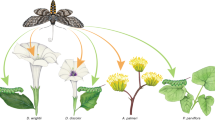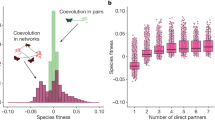Abstract
INTERSPECIFIC mutualisms inherently possess a conflict of interests between the interacting species in that fitness increases of one species occur at the expense of the other. This holds for mutualisms as diverse as plant associations with mycorrhizal fungi or nitrogen-fixing bacteria, animals and endosymbionts, and obligate plant-pollinator associations1–6. Prevailing models of interspecific cooperation predict that mutualistic interactions are evolutionary stable only when both interacting species possess mechanisms to prevent excessive exploitation3–6. In light of this, it is paradoxical that some of the classical examples of coevolved obligate mutualism seemingly do not meet this criterion. In mutualisms involving seed parasites that actively pollinate their hosts, such as yucca/ yucca moth and fig/fig wasp interactions, there is no apparent means of retaliation on behalf of the plant. Predictions from theory suggest that a cryptic mechanism, such as selective abortion of flowers with heavy egg loads, could stabilize these interactions4,6–9. Here we present the first empirical evidence that such a mechanism in fact exists in the yucca/yucca moth interaction. A strong nega-tive effect exists between moth egg number and probability of flower retention. Furthermore, we show a strong positive effect between the number of pollinations received and the probability of flower retention. Selective maturation of fruit with low egg loads and high pollen loads provides a mechanism to increase the quantity and possibly quality of seeds produced, and simultaneously select against moths that lay many eggs per flower or provide low-quality pollinations4,6,8,10. Not only can these results explain the stability of this type of interaction, but selection for high-quality pollination also provides a mechanism to help explain the evolution of active pollination among yucca moths.
This is a preview of subscription content, access via your institution
Access options
Subscribe to this journal
Receive 51 print issues and online access
$199.00 per year
only $3.90 per issue
Buy this article
- Purchase on Springer Link
- Instant access to full article PDF
Prices may be subject to local taxes which are calculated during checkout
Similar content being viewed by others
References
Gehring, C. A. & Whitham, T. G. Nature 353, 556–557 (1991).
McFall-Ngai, M. J. & Ruby, E. G. Science 254, 1491–1494 (1991).
Trivers, R. L. Q. Rev. Biol. 46, 35–57 (1971).
Axelrod, R. & Hamilton, W. D. Science 242, 1385–1390 (1981).
Soberon Mainero, J. & Martinez del Rio, C. in The Biology of Mutualism (ed. Boucher, D. H.) 192–216 (Oxford Univ. Press, New York, 1985).
Bull, J. J. & Rice, W. R. J. theor. Biol. 149, 63–74 (1991).
Janzen, D. J. A. Rev. Ecol. Syst. 10, 13–51 (1979).
Murray, M. Biol. J. Linn. Soc. 26, 69–81 (1985).
Bronstein, J. in Plant-Insect Interactions Vol. 4 (ed. Bernays, E.) 1–44 (CRC Press, Boca Raton, Florida, 1992).
Stephenson, A. G. A. Rev. Ecol. Syst. 12, 253–279 (1981).
Riley, C. V. A. Rep. MO Bot. Gard. 3, 99–158 (1892).
Kiester, A. R., Lande, R. & Schemske, D. W. Am. Nat. 124, 220–243 (1984).
Addicott, J. F., Bronstein, J. & Kjellberg, F. in Genetics, Evolution and Coordination of Insect Life Cycles (ed. Gilbert, F.) 143–161 (Springer, London, 1990).
Powell, J. A. Trends Ecol. Evol. 7, 10–14 (1992).
Pellmyr, O. & Thompson, J. N. Proc. natn. Acad. Sci. U.S.A. 89, 2927–2929 (1992).
Thompson, J. N. & Pellmyr, O. Ecology 73, 1780–1791 (1992).
Pammel, L. H. Science 61, 414–415 (1925).
Davis, D. R. Bull. US natn. Hist. Mus. 255, 1–170 (1967).
Sutherland, S. & Delph, L. F. Ecology 65, 1093–1104 (1984).
Udovic, D. & Aker, C. Oecologia 49, 245–248 (1981).
Richardson, T. E. & Stephenson, A. G. Evolution 46, 1731–1739 (1990).
Schlichting, C. D., Stephenson, A. G., Small, L. E. & Winsor, J. A. Evolution 44, 1358–1372 (1992).
Lande, R. & Arnold, S. J. Evolution 37, 1210–1226 (1983).
Jayne, B. C. & Bennett, A. F. Evolution 44, 1204–1229 (1990).
Bogler, D. J. & Simpson, B. B. Kew R. Bot. Gard. Monocot. Symp. Abstr. 3 (1993).
Sutherland, S. D. thesis, Univ. Arizona (1982).
Trelease, W. A. Rep. MO Bot. Gard. 13, 27–133 (1902).
Gentry, H. S. Agaves of Continental North America (Univ. of Arizona Press, Tucson, 1982).
Becerra, J. X. & Lloyd, D. G. Evolution 46, 458–469 (1992).
Kingsolver, R. W. thesis, Univ. Kansas (1984).
Author information
Authors and Affiliations
Rights and permissions
About this article
Cite this article
Pellmyr, O., Huth, C. Evolutionary stability of mutualism between yuccas and yucca moths. Nature 372, 257–260 (1994). https://doi.org/10.1038/372257a0
Received:
Accepted:
Issue Date:
DOI: https://doi.org/10.1038/372257a0
This article is cited by
-
A general mathematical model for coevolutionary dynamics of mutualisms with partner discrimination
Theoretical Ecology (2022)
-
Tetranorsesquiterpenoids as Attractants of Yucca Moths to Yucca Flowers
Journal of Chemical Ecology (2021)
-
Foundress numbers and the timing of selective events during interactions between figs and fig wasps
Scientific Reports (2019)
-
Population variation in the intensity of fruit infestation and pre-dispersal seed predation in Yucca schidigera (Asparagaceae) by its obligate pollinator
Plant Ecology (2019)
-
Policing the legume-Rhizobium symbiosis: a critical test of partner choice
Scientific Reports (2017)
Comments
By submitting a comment you agree to abide by our Terms and Community Guidelines. If you find something abusive or that does not comply with our terms or guidelines please flag it as inappropriate.



